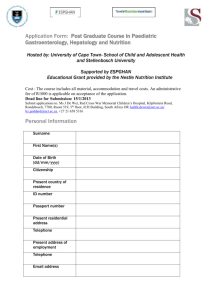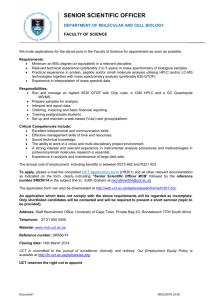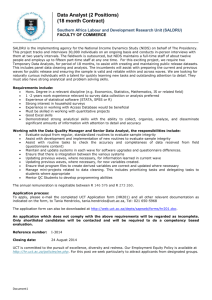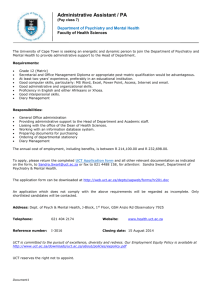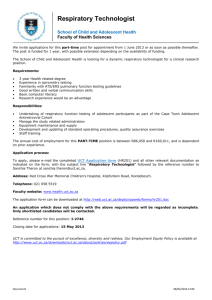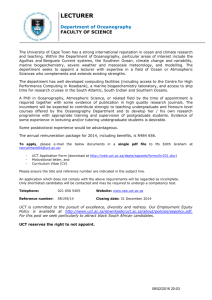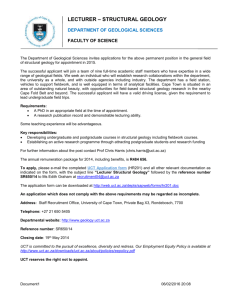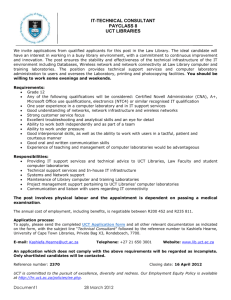Prestigious UCT award honours mental health research
advertisement
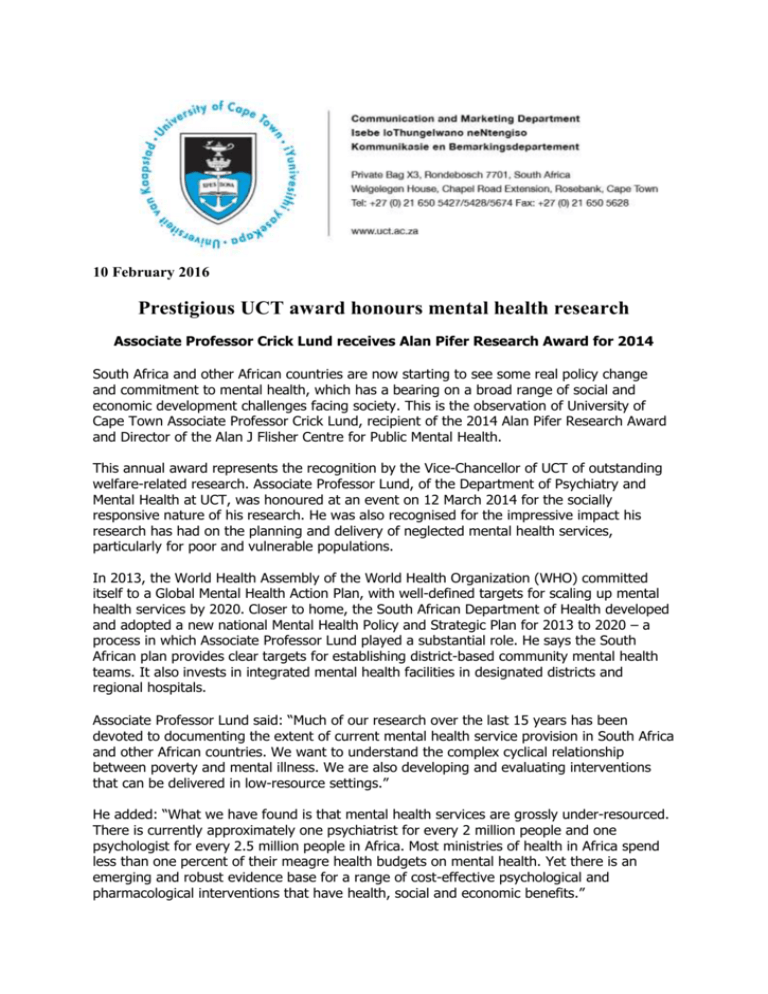
10 February 2016 Prestigious UCT award honours mental health research Associate Professor Crick Lund receives Alan Pifer Research Award for 2014 South Africa and other African countries are now starting to see some real policy change and commitment to mental health, which has a bearing on a broad range of social and economic development challenges facing society. This is the observation of University of Cape Town Associate Professor Crick Lund, recipient of the 2014 Alan Pifer Research Award and Director of the Alan J Flisher Centre for Public Mental Health. This annual award represents the recognition by the Vice-Chancellor of UCT of outstanding welfare-related research. Associate Professor Lund, of the Department of Psychiatry and Mental Health at UCT, was honoured at an event on 12 March 2014 for the socially responsive nature of his research. He was also recognised for the impressive impact his research has had on the planning and delivery of neglected mental health services, particularly for poor and vulnerable populations. In 2013, the World Health Assembly of the World Health Organization (WHO) committed itself to a Global Mental Health Action Plan, with well-defined targets for scaling up mental health services by 2020. Closer to home, the South African Department of Health developed and adopted a new national Mental Health Policy and Strategic Plan for 2013 to 2020 – a process in which Associate Professor Lund played a substantial role. He says the South African plan provides clear targets for establishing district-based community mental health teams. It also invests in integrated mental health facilities in designated districts and regional hospitals. Associate Professor Lund said: “Much of our research over the last 15 years has been devoted to documenting the extent of current mental health service provision in South Africa and other African countries. We want to understand the complex cyclical relationship between poverty and mental illness. We are also developing and evaluating interventions that can be delivered in low-resource settings.” He added: “What we have found is that mental health services are grossly under-resourced. There is currently approximately one psychiatrist for every 2 million people and one psychologist for every 2.5 million people in Africa. Most ministries of health in Africa spend less than one percent of their meagre health budgets on mental health. Yet there is an emerging and robust evidence base for a range of cost-effective psychological and pharmacological interventions that have health, social and economic benefits.” UCT Vice-Chancellor Dr Max Price said at the award ceremony on 12 March 2014 that UCT has tried to maintain and extend its ethos as a university which is particularly concerned about social justice and equality. Associate Professor Lund’s achievements have added to this ethos and what the university is trying to achieve. Associate Professor Lund said the award is an opportunity to draw attention to neglected mental health needs and to press further for more priority to be given to mental health policy. He said: “I am very honoured to receive the Alan Pifer Research Award for 2014. People living with mental health problems, particularly those living in poverty, remain an extremely vulnerable group in our society.” Background information: The Alan J Flisher Centre for Public Mental Health is a joint initiative of the Department of Psychiatry and Mental Health at UCT and the Department of Psychology at Stellenbosch University. Researchers at the centre currently work with government health ministries, other academic partners, NGOs and the WHO in eight countries in sub-Saharan Africa and south Asia, implementing and evaluating interventions that can be delivered at low cost for vulnerable populations living in poverty. Some of the projects include: PRIME (Programme for Improving Mental Healthcare) project: Researchers are implementing care packages for psychosis, depression and alcohol use disorders in district demonstration sites in Ethiopia, India, Nepal, South Africa and Uganda (www.prime.uct.ac.za). AFFIRM (Africa Focus on Intervention Research for Mental Health) project: Researchers are conducting randomised controlled trials using a “task-sharing” approach to deliver mental health interventions for people with severe mental illness in rural Ethiopia, as well as depressed antenatal mothers in Khayelitsha, Cape Town (www.affirm.uct.ac.za). EMERALD (Emerging Mental Health Systems in Low- and Middle-Income Countries) project: Researchers are, among other tasks, calculating the costs of delivering and scaling up care packages in Ethiopia, India, Nepal, Nigeria, South Africa and Uganda. They are also assessing the household economic impact of living with psychosis, depression, alcohol use disorders and epilepsy (www.emerald-project.eu). Perinatal Mental Health Project: This project delivers integrated mental healthcare for mothers during the perinatal period at three maternity clinics in Cape Town. It is involved in an ongoing process of developing screening tools, evaluating outcomes and advocating for better mental healthcare for mothers (www.pmhp.za.org). ENDS Issued by: UCT Communication and Marketing Department Kemantha Govender Media Liaison Officer Communication and Marketing Department University of Cape Town Welgelegen, Upper Chapel Road Extension, Rosebank Tel: (021) 650 5672 Fax: (021) 650 3780 Cell: (084) 737 6522 E-mail: kemantha.govender@uct.ac.za Website: www.uct.ac.za
